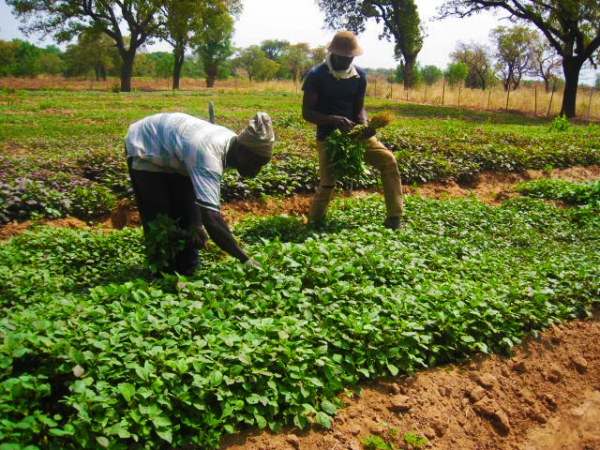BasicNeeds-Ghana has successfully ended the first phase of a dry season gardening project funded by the United Nations Development Programme (UNDP) Adaptation Fund. Activities of the first phase of the project, titled: “Promoting Gardening for Improved Mental Health Outcomes and Productivity in Northern Ghana”, started in May 2018 and came to an end in April 2019.
The first phase of the project was meant to enable persons living with mental health disorders in four (4) communities of the Savelugu Municipality to become productive and empower them to contribute towards their families’ income and nutritional needs through dry season gardening. BasicNeeds-Ghana, therefore, identified and trained 100 women, men and young people with mental illness and their care givers from Zaazi, Bihinaayili, Nyoglo and Libga communities in organic farming practices and equipped them with the needed tools to undertake dry season gardening. By so doing, BasicNeeds-Ghana was meeting the main objective of the project which is “to reduce extreme poverty and social exclusion and to promote environmentally sustainable development in Ghana”.
Phase one began with an engagement with community leaders to brief them about the project, solicit land for the beneficiaries and advocate for their protection of the beneficiaries from stigma, violence or abuse. Project confirmation meetings were also held to confirm the skills, interests and needs of persons with mental illness in vegetable production.
Technical Officers from the Savelugu Municipal Agricultural Extension Office trained the beneficiaries on good agronomic practices, pest and crop management and organic farming techniques to ensure that they carried out their gardening in environmentally sustainable ways.
After the training, the beneficiaries were supported with water pumping machines, vegetable seeds/seedlings, gardening tools, fencing wires, hoes and cutlasses to begin cultivation. Some of the vegetables they planted are kenaf, alefu, beans and ayoyo. Community mental health volunteers were tasked with supporting the beneficiaries to manage their farms and maintain the link with the Agric officers.
All 100 beneficiaries, 50 of whom are female, have successfully harvested their crops and reverted the farmlands to the landowners for cultivation during the rainy season. From their harvest, the beneficiaries consumed 53 basins of kenaf, 1 basin of alefu, 1 basin of beans and 5 basins of ayoyo. They also made some money by selling 317 basins of kenaf, 12 basins of alefu, 4 basins of beans and 51 basins of ayoyo.
Some of the beneficiaries said the money they have made from the sale of the vegetables will be used to augment their family’s income. Sumanya Alhassan, a carer from Zaazi said “I harvested kenaf twice before the dry season was over. It was such a good harvest. I was able to sell three (3) basins from the surplus after I used the vegetable to prepare soup for my family. I used the money I earned from the sale to buy medicine for my son who is suffering from epilepsy and to support our family upkeep. I am extremely grateful to UNDP through whom BasicNeeds-Ghana was able to come to our aid.”
The beneficiaries claim that they feel the negative attitudes they used to suffer from some members of the community has reduced because the project. They cite the fact of people buying their vegetables from the market to be evidence of this positive change


